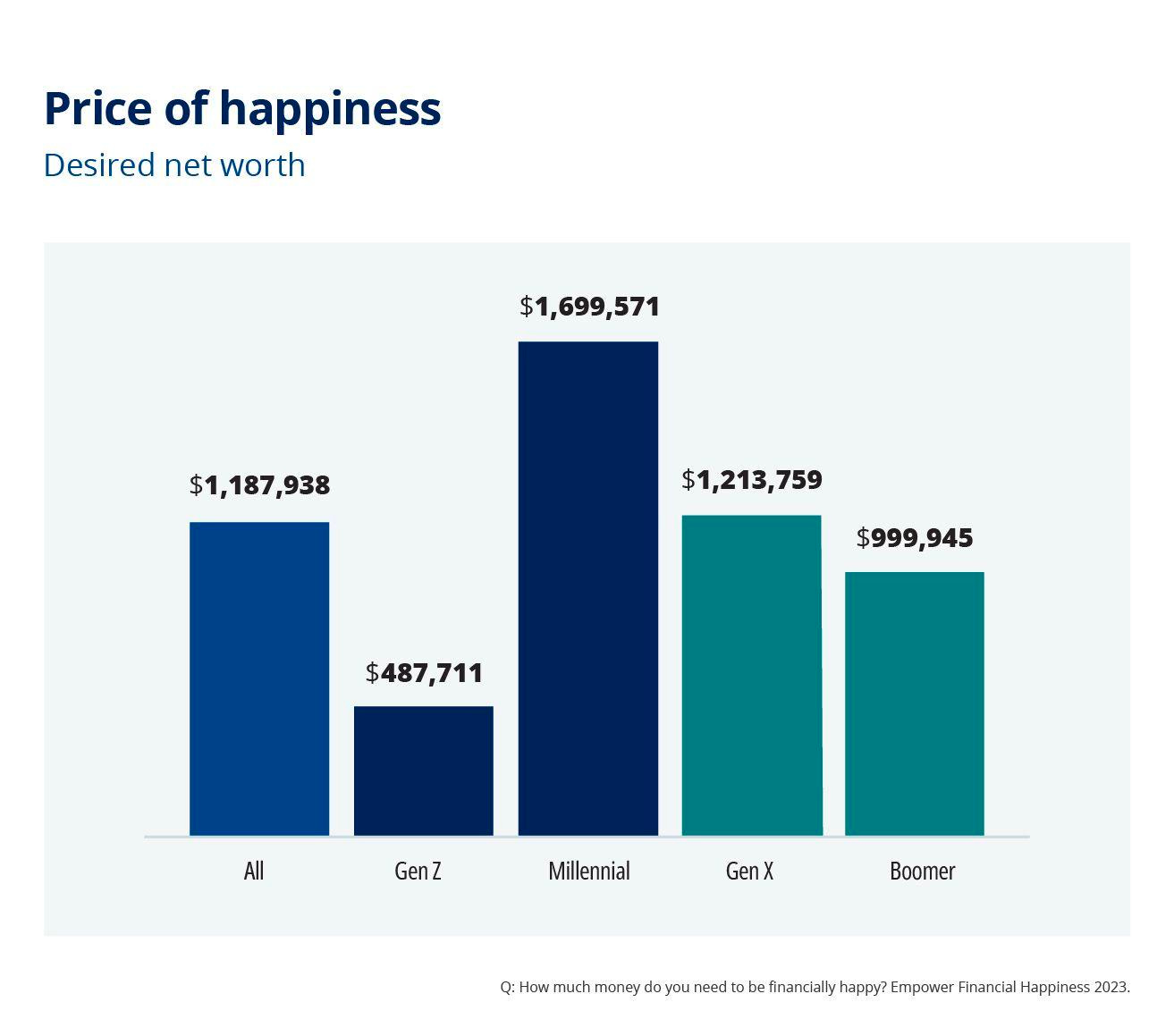Is there an amount of money you could receive today that would make you happy? If so, how much money would you need to be happy? Americans are divided over this question: 59% believe that money can buy happiness, according to a recent survey. The generational divide over the amount of money we believe would make us happy is stark. Millennials feel they need the most money, at almost $1.7 million, and the generation right below them, Gen Z, believe they need less than $500,000 to be happy. Gen X and Baby Boomers fall in the middle.

Why is there such a huge disparity between generations? I believe it simply can be explained by the stages of life those at different ages are in. Millennials are right in the thick of buying their first home, which as we all know have skyrocketed in price over the last few years, and are starting to have children or already have young children. If you have children and are trying to buy your first home, you probably feel you need a significant amount of money to be happy! Gen X and Boomers likely aren’t raising young kids or buying their first home, but are thinking more about retirement. Gen Z needs significantly less to be happy because they have significantly less financial needs. If they aren’t thinking about retirement, having kids, or buying houses, it takes a lot less money to be happy.
Money buying happiness is a recent idea
Surprisingly, we have not been wondering how much money we need to be happy for very long. The question first became widespread in the 1960s, and is being asked more than ever today.

Why have we only recently become enamored with the idea of money bringing happiness? I believe it comes down to Maslow’s hierarchy of needs. Our ancestors worried about having food, water, shelter, good health, and employment. We still have some struggles today, obviously, but as a country we have improved dramatically in each of those areas. The majority of Americans today do not have to worry about food, shelter, water, or employment and will likely live longer than their parents and grandparents as life expectancies continue to rise.
Can money actually make you happy?
Having more money can make someone happier if that money is used to satisfy some of our basic needs. Someone who isn’t able to afford a house or a car will probably become measurably happier if they receive money that enables them to purchase a home and a car. However, there are diminishing returns. Going from a 4-bedroom house to a 6-bedroom house probably doesn’t feel as good as buying your first home. Trading in your 2017 model car for a 2023 model probably won’t make you as happy as your first car did.
While the majority of Americans believe there is an amount of money that will make them happy, that number appears to be a moving target. The median net worth of all Americans is $260,223. On average, the magic number that Americans said they needed to be happy was about $1.2 million. Most Americans believe they need a significantly higher net worth to actually be happy.
We ask our millionaire clients how much net worth they consider to be wealthy. 88% say that you need at least $3 million in net worth to be wealthy, and 75% say that they do not consider themselves wealthy. Almost all of our clients have more net worth than Americans say they need to be happy, yet they don’t say “I’ve made it,” or “I’m finally happy,” but “I’m not there yet.”
What does make us happy?
I do not believe that the accumulation of wealth, by itself, will make anyone happy. Much of what money can buy can increase your happiness, at least temporarily, but happiness tends to move back to where it was prior to life events or experiences (explained by the hedonic treadmill). As your wealth increases, the amount of net worth you believe you need to be happy will probably increase as well. If more money won’t make you happy, what will?
The answer isn’t easy to quantify like money, and may even be harder to achieve than a certain number on your net worth statement. Going back to Maslow’s hierarchy of needs, what actually increases life satisfaction, or happiness, after your basic needs are met include friends, family, achievement, the respect of others, purpose and meaning, creativity, and acceptance. This ties in well with our fifth level of wealth, abundance, where money doesn’t matter anymore and your focus is more on experiences and making the world a better place.
What do all of those factors have in common? Money can be used as a tool to achieve them. It’s a very important distinction: money can be the tool you use to create memories with friends and family, it can be the tool you use to gain the respect of others or accomplish certain goals, and it can be a tool that allows you to be more creative and give yourself purpose and meaning. However, one of our biggest beliefs is that money is a tool, not a goal. Instead of focusing on a dollar amount that you believe will make you happy, focus on what your net worth can be used to create in your own life and for others.













